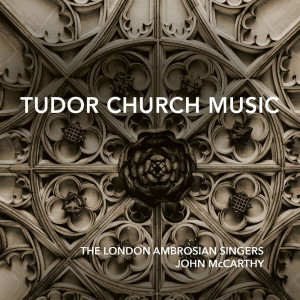
Tudor Church Music – The Easter Liturgy of the Church of England
The London Ambrosian Singers/John McCarthy
Oskar Peter (organ)
rec. 1968-69
Texts included in English and Latin
TUDOR 7210 [77]
Many readers will recall John McCarthy and the Ambrosian Singers from their various appearances on disc. McCarthy died in 2009 at the age of 92 but during his long career, which had begun as a professional singer, he had directed the professional choir since its formation in 1951 making numerous recordings of early and Renaissance music along historically informed principles. From 1961-66 the choir was de facto the London Symphony Orchestra’s Chorus and was well known for its contributions to the LSO’s recordings. However, it continued to be associated with the post-War British revival of early music not least through Alfred Deller – their repertoire included Purcell, Tomkins, Dunstable, and Dufay – as well as The Cries of London singing Machaut, Gabrieli, Morales and others. Just to keep up to date they also sang on recordings of music by Rubbra and Still.
Tudor has now reissued a set originally issued as Die Osterliturgie Der Anglikanischen Kirche on two Tudor LPs, TUD 0551/52, recorded during 1968-69 and released in 1970, and which also appeared on Musical Heritage Society MHS 1526/27. Its range extends from John Taverner to the Preces and some of the Responses of William Smith, whose birth in 1603, in the year Elizabeth I died, is presumably meant to indicate the continuation of the underlying principles of composition of Tudor music well into the new century. Of those born into the Tudor period, it’s probably Byrd and Tomkins who may be considered the last true representative figures of the age, both surviving until 1623.
The devotional music is programmed around the central figures of Gibbons, Byrd, Taverner and Tallis, though other important composers are represented by one piece, such as William Mundy’s O Lord, the Maker of all thing and John Redford’s setting of the Creed. Much has happened in the last 45 years or so in terms of performance practice and even five or six years after these recordings were made David Wulstan’s The Clerkes of Oxenford recorded LPs of Tudor music that in their clarity, mobility and specialised conception took interpretation to a new level of penetrative insight.
That’s not to underestimate McCarthy and his famous choir and the insights that they brought. There’s a striking version of Taverner’s Benedictus in this album, and Gibbons’s own Benedictus is not far short in directness. The expressive charge of the Mundy is undeniable, not least in the contribution of the basses. The thickness and density of the choir can, though, be obtrusive, and some singer’s individual vibratos are audible, to the detriment of ensemble. McCarthy’s shaping of the music is impressive, however, and he has with him organist Oskar Peter, who was associated with Schola Cantorum Basiliensis, with whom he recorded, though almost always as a recorder player. He performs the Kidderminster, a sixteenth century Prelude and several other organ works by Tallis, Redford, Tomkins and the final In nomine, by Richard Alwood.
The digital remastering of Gerhard Schuler is excellent and Meinhard Winkler’s introduction offers a succinct overview of Tudor choral music. Texts are included whether in Latin (Weelkes and a couple of Byrd settings) or overwhelmingly English and the Collects and Responses are printed too.
From the external documentation it’s not immediately clear that this is a reissue but bearing that in mind, as well as the changing tastes in performances of music of this period, this twofer makes a welcome return to the catalogue.
Jonathan Woolf
Contents
The Kidderminster: Prelude
William Byrd (1539/40-1623)
Sing joyfully
William Smith (1603-1645)
The Preces and Responses (Excerpts)
Orlando Gibbons (1583-1625)
Awake up, my glory
Te Deum
Benedictus
Robert Stone (1516-1613)
The Responses – The Lord’s Prayer
Thomas Weelkes (1576-1623)
Gloria
Thomas Tallis (c.1505-1585)
Veni Redemptor
If ye love me
William Byrd
Kyrie
Thomas Tomkins (c.1539/40-1623)
Creed
John Redford (c.1500-1547)
Lucem tuam
John Taverner (c.1490-1545)
Sanctus
Benedictus
William Byrd
Agnus Dei
Thomas Tallis
Gloria
Te Deum
William Mundy (c.1529-1591)
O Lord, the Maker of All Thing
William Byrd
The Preces
When Israel came out of Egypt
Thomas Tomkins
Interlude (A Short Verse), MB 27
William Byrd
Magnificat
Nunc dimittis
The Responses
Robert Whyte (c.1538-1574)
O Praise God
Richard Alwood (16th century)
In Nomine
Help us financially by purchasing through





















